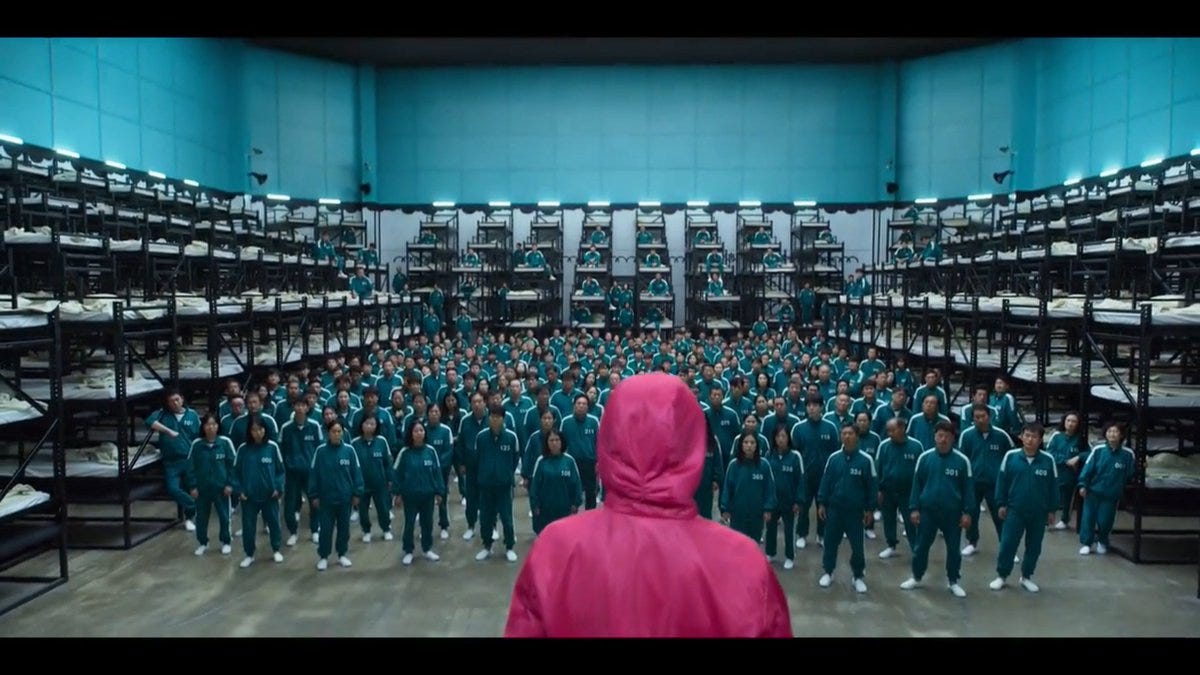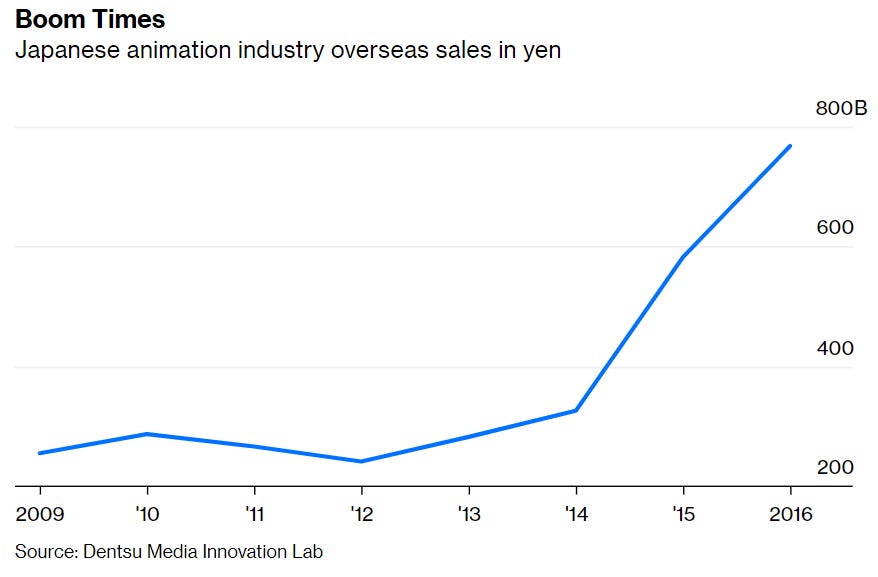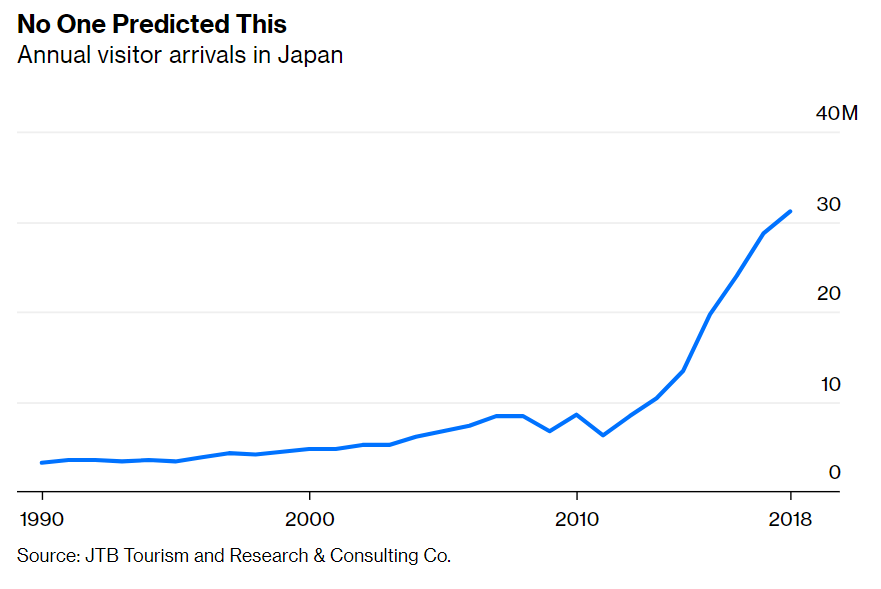What makes a cultural superpower?
South Korea's rise signals the end of the Age of Empire, and the beginning of the Age of Cultural Empire
The hit Netflix show Squid Game — the most-watched program in the platform’s history — once again has everyone talking about the amazing success of South Korea’s cultural exports. Two years ago it was the movie Parasite. And the massive appeal of K-pop is now one of the most-discussed phenomena in entertainment, with BTS becoming an international sensation comparable in some ways to the Beatles, and K-pop fandoms in the U.S. becoming so big and organized that they’re now politically relevant. Meanwhile, Korean cosmetics are doing huge business in America, with sales quadrupling between 2016 and 2018 alone; the “K-beauty” industry is forecast to be raking in $31 billion worldwide by 2029. And though they haven’t yet caught on huge in the U.S., Korean romantic dramas have been a global phenomenon for a while now.
As I see it, this qualifies South Korea for the title of “cultural superpower”. There’s no hard-and-fast definition for this term, of course. We might try to create some metric — cultural exports per capita, perhaps weighted by the number of export markets with significant penetration — but in South Korea’s case, we know it when we see it.
There are a lot of interesting questions surrounding this phenomenon. The main one, of course, is “Why do people like South Korean stuff so much?” A lot of ink has been spilled over this, and I don’t really know enough to weigh in. But there is one interesting thing I’ve noticed, which is that South Korea is among the first countries — perhaps the first country — to become a modern cultural superpower without having had an empire in the last 500 years.
Culture and empire
The U.S., Britain, Japan and France export lots of cultural products and have strong mindshares around the world. But all of these countries have a history of conquest and military might. The U.S. perhaps least so — our overseas wars and string of overseas bases are not really an empire in the sense that Britain or France was — but enough people say that “America is an empire” that it’s clear that many people think of it in a similar way. It’s easy to imagine that these countries’ international cultural appeal is connected, in some sense, to the sense that these are, or were, mighty and powerful countries. That is a fundamentally nationalistic way of thinking — it implicitly sees the world as a competition between nations in which great nations conquer and lesser ones are conquered. It seems possible that this vision of the world is lurking in the back of many people’s minds when they consume Hollywood movies or British fantasy novels or Japanese cartoons or French perfume.
But not South Korea. Korea has always been a small country (or set of countries) surrounded by bigger countries, which often invaded it — a “shrimp among whales”, as the saying goes. It has never been on anyone’s list of the most martially powerful civilizations. And yet, people love K-pop and K-dramas and K-beauty and K-everything. Not many other countries have accomplished that. The closest examples might be Italy (which is a powerhouse in the global fashion industry but whose colonial empire was barely deserving of the name), Jamaica (whose music is highly influential), India (which has had some success with Bollywood exports to developing countries), and maybe Hong Kong (which was a British colony when it created its internationally recognized film industry).
So does this mean that the “cultural appeal comes from imperial prowess” theory is just wrong? Perhaps! Another possibility is that it used to be more right than it is now. After World War 2 and the advent of nuclear weapons, the norm of fixed international borders became generally accepted and entrenched; conquest still happens, but it’s rare and frowned upon now, and there have basically been no new empires created in recent decades. Perhaps after enough generations have passed such that imperialism and conquest fade into history for much of the world’s population, people simply move on to other concepts of national greatness. In other worlds, maybe South Korea’s appeal is a sign that the world is finally becoming a less martial, nationalistic place.
Can government sell culture?
The next question is: How does a country become a cultural superpower? There are obvious advantages to becoming one — export revenue, of course, but also international “soft power”. But intentionally becoming one seems like a very hard thing to do — harder than auto exports, electronics exports, etc.
This can easily be seen by looking at Japan’s experience. If you don’t know about the history of Japan’s cultural industries, check out the book Pure Invention by Matt Alt. Japan is undeniably a cultural superpower — its cartoons, video games, and fashion are a global touchstone for untold millions. Japanese creators are among the most creative and original in the world, and Japanese style is so distinctive and appealing that it has spawned whole subcultures.
And yet this success was entirely bottom-up. When the Japanese government tried to get involved about 10 years ago, with a program called the “Cool Japan Strategy”, it failed pretty spectacularly. The government ended up mostly just shoveling money at a few big advertising agencies (especially Dentsu); these agencies had very little idea how to sell Japanese cultural products overseas. Everyone loved Japanese stuff, but the country was having trouble making money off of this love. People in other countries pirated anime, aped Japanese fashion, and threw their own cosplay conventions. Except for Nintendo and a few other video game makers, creators in Japan were not getting paid what they deserved.
Then Netflix stepped in, and succeeded where Dentsu had failed. It made deals with Japanese animation studios and sold their products overseas. This meant that Japanese studios were finally getting paid by their overseas fans:
Meanwhile, cheap translation allowed manga (comics) to become a big export business as well. And with the global success of Uniqlo, Japan is finally starting to monetize its fashion prowess as well. (Hopefully some Japanese brands will figure out how to take the high end of the market away from their tired, worn-out French and Italian rivals.)
But the Japanese government did manage to capitalize on the country’s cultural superpower in one big, important way: Tourism. People who love Japanese cultural products, or the Japanese aesthetic in general, often want to go to visit the country, and this is big business. An early 2010s initiative to promote more tourism ended up succeeding beyond the government’s wildest expectations:
Covid killed this boom, of course, but it’ll be back eventually.
So how can a country sell its culture?
The success of Korea, and the belated success of Japan, offer some clues about how a country can make money off of its cultural appeal. Here are some rules of thumb:
1) Be confident. When I went to interview an executive at Japanese publisher Kodansha in 2015, he told me that his company didn’t try to do more overseas sales because Americans aren’t interested in depictions of Asian people. The success of Netflix anime, translated manga, Squid Game, and Parasite have obviously proven that thesis very very wrong. And outside of America, the success of romantic K-dramas proves it even more wrong. In order to make overseas sales, you need the confidence to believe that foreigners will like what you make.
2) Be corporate. People love reggae, but it took music labels to monetize that. And people love Japanese street fashion, but it took Uniqlo’s plain, mass-market styles to actually rake in the dollars. Indie creators often generate cultural appeal, but corporations are the key actors who capitalize on that. So make sure to set up your intellectual property laws to allow corporations to make money, while not cracking down on or stifling the indie creators who generate the real creativity.
3) Segment products for foreign consumption. Netflix is commissioning anime with slightly different themes and animation styles than the stuff that Japanese studios produce for their domestic market. Americans and Indonesians and Brazilians love Japanese stuff, but maybe not quite the exact kind of Japanese stuff that Japanese people love. The solution is to produce some products aimed specifically at foreign audiences. The K-pop industry has done this wonderfully well, with bands like Blackpink aimed more at American sensibilities, and others like Twice that tend to appeal more to Japanese audiences.
4) Lean into your strengths. Japanese music hasn’t caught on like K-pop, and Korean video games haven’t caught on like Nintendo. Japanese movies haven’t caught on like Hollywood, and American cartoons haven’t caught on like anime. And that’s OK! A cultural superpower doesn’t have to dominate every market segment. Figure out what kinds of cultural products foreigners are into, and then monetize those segments.
5) Use tourism. Europe, America, and Japan’s success in raking in tourism dollars — which Korea has started to emulate somewhat — shows one big way that cultural appeal can be monetized. Invade the world (with your cultural products), then invite the world.
Today, people love South Korean dramas and music and cosmetics. Tomorrow they might love Filipino animation, Vietnamese techno music, Latin American dramas, Indonesian R&B, Polish video games, Nigerian movies, or things I haven’t even heard of yet. The age of empire is over, and the age of cultural empire has begun. Don’t know about you, but to me that feels like a win for Planet Earth and the whole human family.





Another successful intentional cultural export is Thai food. The Thai government funds Thai restaurants abroad and trains chefs, although admittedly a lot of it is from before the intentional push.
https://www.splendidtable.org/story/2019/01/10/how-thai-food-took-over-america
As someone who has been consuming Korean music, TV shows and Movies for over a decade now, its good to see mainstream US/EU media finally wake up and take notice beyond the tired old 'oh look, these Asian dudes wear make-up and they performed in our country recently...and they seem to have a lot of fangirls...'. I grew out of kpop almost immediately (as cringe-worthy as any other pop) and roll my eyes at most k-dramas, but love Korean films. They are continuing that old Chinese/HK/Japan tradition of making stunning and absorbing gangster flicks. I would recommend 'Nameless Gangster' and 'New World' to anybody who is struggling to think of what to watch with their weekly pizza.
As for the central question, I would add 2 overlooked drivers:
1) Non-threatening host country - Korea is geopolitically harmless and Japan has been effectively neutered post-1945. That plays a huge role. A Filipino, for example, is more likely than not to approach a Korean TV show with blank-slate curiosity, as opposed to all that baggage that might come with a Chinese TV show. Likewise, today's cultural 'superpowers' are all deemed harmless and/or non-threatening. The only exception might be the US, and even though many/most people apparently see Americans as a 'threat to word peace' (paraphrasing), Hollywood's lead was entrenched Pre-Cold War and is a legacy more than anything.
2) Government support - Don't say it too loudly, but the Korean government did provide support to the hallyu industry. Nothing overt or newspaper-worthy. No massive figures. But they have been subtly promoting their cultural exports for at least 15 years. Nothing wrong with this of course and this is not to say that the K-wave isn't organic, but it has definitely received a helping hand along the way